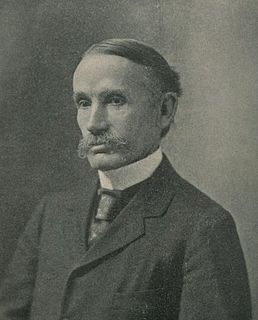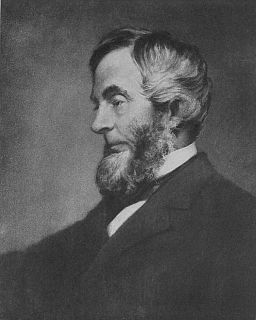Ein Zitat von Alfred Nobel
Ich betrachte großen ererbten Reichtum als ein Unglück, das lediglich dazu dient, die Fähigkeiten der Menschen abzustumpfen. Ein Mann, der über großes Vermögen verfügt, sollte daher nur einen kleinen Teil davon an seine Verwandten abtreten lassen. Auch wenn er Kinder hat, halte ich es für einen Fehler, ihnen beträchtliche Geldsummen zu geben, die über das hinausgehen, was für ihre Ausbildung notwendig ist. Dies fördert lediglich die Faulheit und behindert die gesunde Entwicklung der Fähigkeit des Einzelnen, sich eine unabhängige Position zu verschaffen.
Verwandte Zitate
Ich gehe davon aus, dass „Gentleman“ ein Begriff ist, der nur eine Person in ihrer Beziehung zu anderen beschreibt; aber wenn wir von ihm als „einem Menschen“ sprechen, betrachten wir ihn nicht nur im Hinblick auf seine Mitmenschen, sondern in Bezug auf sich selbst – auf das Leben, auf die Zeit – auf die Ewigkeit.
Betrachten Sie sich selbst als einen Behälter für Reichtum. Was passiert, wenn Ihr Container klein und Ihr Geld groß ist? Du wirst es verlieren. Ihr Container wird überlaufen und das überschüssige Geld wird überall verstreut sein. Mehr Geld als den Container kann man einfach nicht haben. Deshalb müssen Sie zu einem großen Behälter heranwachsen, damit Sie nicht nur mehr Reichtum halten, sondern auch mehr Reichtum anziehen können. Das Universum verabscheut ein Vakuum, und wenn Sie einen sehr großen Geldbehälter haben, wird dieser hineinstürmen und den Raum füllen.
Der Mann, der für sich selbst lebt, ist ein Versager. Selbst wenn er viel Reichtum, Position oder Vermögen erlangt, ist er immer noch ein Versager. Der Mann, der für andere lebt, hat wahren Erfolg erzielt. Ein reicher Mann, der seinen Reichtum und seine Position dem Wohl der Menschheit weiht, ist ein Erfolg.
Wenn ich meine Aufzeichnungen über die etwa siebzig Fälle durchblättere, in denen ich in den letzten acht Jahren die Methoden meines Freundes Sherlock Holmes studiert habe, finde ich viele tragisch, einige komisch, eine große Anzahl lediglich seltsam, aber keines davon alltäglich; denn da er mehr aus Liebe zu seiner Kunst als aus der Erlangung von Reichtum heraus arbeitete, lehnte er es ab, sich an irgendeiner Untersuchung zu beteiligen, die nicht auf das Ungewöhnliche oder gar Fantastische abzielte.
Männer sind von Natur aus faul und brauchen einen großen Anreiz, um ihre schwindenden Ambitionen anzuspornen und sie in die Lage zu versetzen, die Trägheit zu überwinden, die aus der Bequemlichkeit und dem Bewusstsein des ererbten Reichtums resultiert. Was auch immer in einem jungen Mann das Gefühl schwächt, dass er seinen Weg in der Welt finden muss, schwächt seine Erfolgsaussichten. Armut war schon immer der unschätzbare Ansporn, der den Menschen dazu getrieben hat, sein eigenes Brot zu verdienen.
Stellen Sie sicher, dass Sie den Armen die Hilfe zukommen lassen, die sie am meisten brauchen. Wenn Sie Geld geben, geben Sie es aus und überlassen Sie es ihnen nicht einfach. Oft friert und hungrig der arme Mann nicht, sondern er ist schmutzig, zerlumpt und eklig. Es ist zum Teil sein Geschmack und nicht nur sein Unglück.
Es ist wahr, dass Reichtum besser als Armut ist und gewählt werden sollte, sofern Reichtum Zeit für ideale Ziele und die Ausübung idealer Energien gibt. Aber Reichtum tut dies nur in einem Teil der tatsächlichen Fälle. Anderswo sind der Wunsch, Reichtum zu erlangen und die Angst, ihn zu verlieren, unsere Hauptverursacher von Feigheit und Propagatoren von Korruption. Es muss Tausende von Situationen geben, in denen ein wohlhabender Mann ein Sklave sein muss, während ein Mann, für den Armut keine Angst hat, ein freier Mann wird.
Die Schwarzgeldproblematik sollte nicht im Sinne einer bloßen Steuervermeidung missverstanden werden. Es ist in der Tat ein schweres systemisches Verbrechen, dem Finanzsystem des Landes die Erträge aus Reichtum vorzuenthalten. Eine solche Verleugnung sollte eigentlich als Verrat eingestuft werden, da die Möglichkeit, den Reichtum zugunsten der Armen zu teilen, vorsätzlich verweigert wird.
Der wohlhabende Mann sollte alle überschüssigen Einnahmen, die ihm zufließen, lediglich als Treuhandfonds betrachten, die er verwalten soll, um die vorteilhaftesten Ergebnisse für die Gemeinschaft zu erzielen – der wohlhabende Mann wird somit zum bloßen Treuhänder und Agenten seiner Gemeinschaft Er brachte seine überlegene Weisheit, Erfahrung und Fähigkeit zur Verwaltung in ihren Dienst und tat für sie mehr, als sie für sich selbst tun würden oder könnten.
Die große Leidenschaft im Leben eines Mannes gilt vielleicht nicht Frauen oder Männern oder Reichtum oder Spielzeug oder Ruhm oder sogar seinen Kindern, sondern seiner Männlichkeit, und an jedem Punkt seines Lebens könnte er versucht sein, die Dinge dafür aufzugeben Für diese Männlichkeit gibt er regelmäßig sein Leben hin. Vielleicht hält er diese Leidenschaft vor den Frauen geheim und verleugnet sie vielleicht sogar vor sich selbst, aber die anderen Jungen wissen es über sich selbst und die Klügeren wissen es auch über den Rest von uns.
Dull wäre der Mann, der diesen Plan der Sozialindustrie lediglich tolerieren sollte. Schwach wäre die Position desjenigen, der bei seiner Verteidigung einen entschuldigenden Ton anschlagen oder seine Ansprüche lediglich negativ darstellen würde, indem er die Übel und Gefahren des sozialistischen Plans aufdeckt.
Reichtum bringt edle Chancen mit sich, und Kompetenz ist ein geeignetes Ziel; Aber Reichtum und sogar Kompetenz können zu einem zu hohen Preis erkauft werden. Reichtum selbst hat keine moralische Eigenschaft. Nicht Geld, sondern die Liebe zum Geld ist die Wurzel allen Übels. Das Wesentliche ist die Beziehung zwischen Reichtum und Geist sowie dem Charakter seines Besitzers.
Mathematische Kenntnisse sind nicht – wie allen Cambridge-Männern sicherlich bewusst ist – das Ergebnis einer besonderen Begabung. Es ist lediglich die Entwicklung jener Vorstellungen von Form und Zahl, die jeder Mensch besitzt; und jeder Mensch mit durchschnittlichem Intellekt kann sich zu einem guten Mathematiker entwickeln, wenn er nur ständig aufmerksam ist; im Klartext: Denken Sie ausreichend über das Thema nach.





































